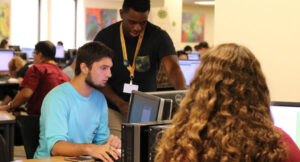SMART Lab returns to mandatory in-person instruction

The SMART Lab returned to its in-person operations at the Tampa and St. Pete campuses at the beginning of the spring semester, along with its mandatory attendance policy, following its voluntary practices throughout the pandemic.
Assistant Director of the SMART Lab Monica Quintero said the SMART Lab was originally scheduled to return to fully in-person learning last semester. Only several days before classes began, the last-minute decision to wait was made due to the surge in delta variant cases and the uncertainties associated with classes going online.
The program is offered for several introductory college math courses, including College Algebra, Business Calculus and Introduction to College Mathematics, among others. The SMART Lab, Quintero said, is intended to help create good studying and learning habits for its students to prepare them for more advanced classes.
“The purpose of the SMART Lab model is to almost model … and demonstrate for them, here’s how you should be approaching your course,” Quintero said. “Hopefully [students] take those skills with them when they move on to their next math courses — or really any other course.”
In spring 2020, the SMART Lab transitioned to remote learning until fall 2021, when it began an optional hybrid schedule.
During this period, Quintero said the number of student tutors employed at the SMART Lab gradually decreased as the tutors graduated and weren’t replaced. However, with the return to fully in-person operations, the SMART Lab has once again regained its full staff numbers, said Quintero.
“[The student staff decreased], thankfully through natural attrition,” said Quintero. “In that first semester, we had a full staff of tutors because we thought we were going to be in person.
“Through the couple of semesters, we just let that staff kind of trickle down because we had so much less volume. Now that we have come back face-to-face, we have staffed back up to those full levels.”
The return to face-to-face interactions at the SMART Lab this semester was prompted by the performance shown by students during the optional hybrid set-up last semester, said Quintero. She said students were struggling to meet course demands in hybrid settings.
“We were observing with our group of students that they were really struggling getting into the pace of the course,” said Quintero.
“They were missing deadlines. They were missing the deadline to make their test reservation. Or, in some cases, missing the day to come take their test at all,” she said. “We know that providing them with the structure and providing them with the support helps them be successful.”
With COVID-19 in mind, Quintero said attendance will be handled more flexibly and be left to the instructor’s discretion.
“It’s always been a part of the grading structure here where you get to drop your lowest attendance weeks … We’ll definitely maintain that,” said Quintero. “If we get into a situation where two weeks isn’t enough … it’s really going to be up to the instructors for these courses to work with students on a case-by-case basis.”
The return to mandatory attendance has led to criticism from some students, however. Shelby Catroneo, a health sciences major, said the SMART Lab attendance should be based on student need, and that the SMART Lab is a concern during the pandemic.
“To be perfectly honest, I feel like it should be optional to go there if you really need help,” said Catroneo.
“Also, I don’t like the idea that students are required to take their exams at the SMART Lab, even if they’re sick. During the pandemic, I would assume that they would allow students to take it from their homes or dorms so that they’re in an environment they’re comfortable in, and have time to take the test.”
In response to some students’ dismay about the mandatory attendance policy being resumed this semester, Quintero acknowledged that the SMART Lab has always inspired reluctance in students, but the benefits shown with its help are worth the trouble.
“We are trying to help you be successful,” said Quintero. “So I know that sometimes that feels like not what you want to engage in and you don’t want to be required to be here for those hours. But trust me, what you put into it is what you get out of it.”
Quintero said the return in person this semester aligns with the school’s overall transition, and will give students the attention and aid they require.
“I am certainly [not an] expert, but the university is pushing forward with bringing things back in person,” said Quintero. “So I think we’re in line with the timeline of the university.”
“This semester, it was just time to get these resources back in front of our students and provide them the support that we know they need.”








